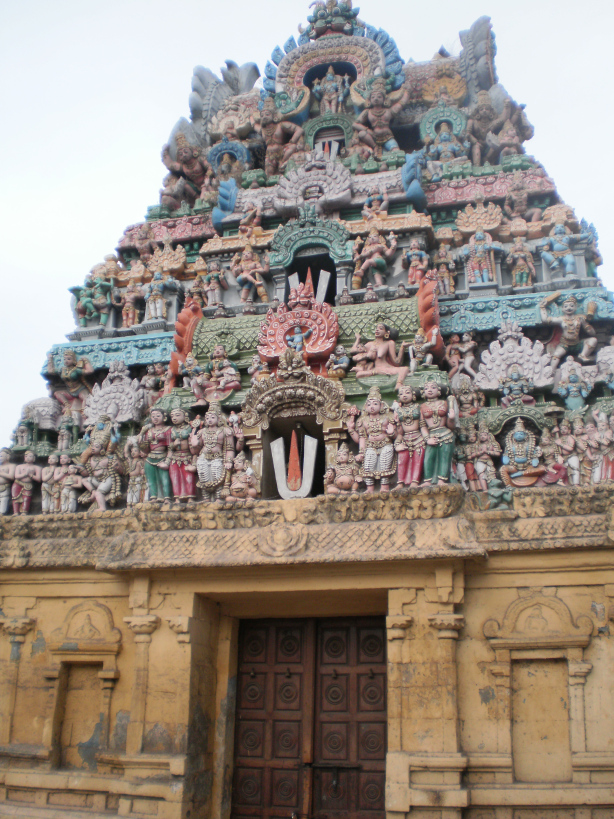Saint Tirugnanasambandar has praised the Lord in his Thevaram hymns.
The tower is clothed by the clouds, Mayendirapalli has many palaces,
tanks with blossoming Lotus flowers where the Lord is on His bull
vehicle. Let us all prostrate on His feet.This is the sixth temple on the northern bank of Cauvery River praised
in Thevaram hymns.
Handsome Shiva is praised as Tirumeni Azhagar and Mother as Vadivambikai for their beauty. Saint Tirugnanasambandar addresses the Lord as Azhagar. Lord Vishnu in Madurai is also called Azhagar in Tamil and
Sundararajan in Sanskrit.
Lord Shiva is Azhagar in this temple. Lord
Brahmma, Sun and Moon had worshipped in this temple. During the month of
Panguni (March-April) the rays of Sun fall on the Lord. On the side
wall of Shriva Shrine, Lord Dakshinamurthy graces.
Temple History:
For his wrong desire on Akalika wife of Maharshi Gautama, Indira was
cursed by the Rishi to have eyes throughout his body. He came to Earth
and prayed to Lord Shiva for relief in many places and this is one among
them. As Indira Maha Indira worshipped here the place came to be
known as Mahendirapalli. A temple was erected here later.
Festival:
Maha Shivrathri in February-March, Margazhi Tiruvadhirai in
December-January. Panguni Uthiram in February-March and Tirukarthikai in
November-December are the festivals celebrated in the temple.
Opening time:
The temple is open from 9.00 a.m. to 12.00 a.m. and 6.00 p.m. to 7.30 p.m.
It is one of the shrines of the 275 Paadal Petra Sthalams - Shiva Sthalams glorified in the early medieval Tevaram poems by Tamil Saivite NayanarTirugnanasambandar.
The rays of Sun fall on the Lord in the month of Panguni, March-April.
Generally Lord Vishnu is called Azhagar-handsome, as He is fond of
dressing. Lord Shiva in Mahendrapalli is celebrated as
handsome-Azhagar.
Sri Chandikeswara graces with his consort in the prakara. There is a
separate shrine for Lord Sri Vinayaka with Ragu and Ketu on both sides.
Lord Muruga graces from His shrine with His consorts Valli and Deivanai.
There are shrines of Sri Kasiviswanatha Mother Visalakshi, Meenakshi
Sundareswarar, Bhairavar and Saneeswarar-Saturn, Sun and Moon. There is
no shrine for Navagrahas- 9 planets in the temple.
Those
suffering from the evil results of past birth (poorva janma karmas),
those facing adverse effects due to Sun, Moon aspects in their
horoscopes have a dip in the Brahmma theertha in the temple for
remedies.
As the holy spring is attributed to Lord Brahmma the Creator,
it is the faith of the people that Brahamma would amend the destiny of
the devotee favourably. Devotees also pray for relief from snake aspects and to gain excellence in academic pursuit.
Do's:
- Do pray your Ishta Devata before pilgrimage to Temple.
- Do contact Temple Devasthanam information centre for enquiry, temple information and for Pooja details etc.
- Do reserve your travel and accommodation at Temple well in advance.
- Do bath and wear clean clothes before you enter the temple.
- Do concentrate on God and Goddess inside the temple.
- Do maintain silence and recite your Istamantram to yourself inside the temple.
- Do observe ancient custom and traditions while in Temple.
- Do respect religious sentiments at Temple.
- Do deposit your offerings in the hundi only.
Don't s:
- Do not come to Temple for any purpose other than worshipping of God and Goddess.
- Do not consume alcoholic drinks at Temple.
- Do not eat non-vegetarian food in the Kshetram.
- Do not approach mediators for quick Darshanam. It may cause inconvenient to others.
- Do not carry any weapon inside the temple.
- Do not wear any head guards like helmets, caps, turbans and hats inside the temple premises.
- Do not perform Sastanga Pranama inside the Sanctum Sanctorum.
- Do not take much time while performing Sparsa Darshanam to God in Garbhagriha.
- Do not buy spurious prasadams from street vendors.
- Do not encourage beggars at Temple.
- Do not spit or create nuisance in the premises of the temple.
